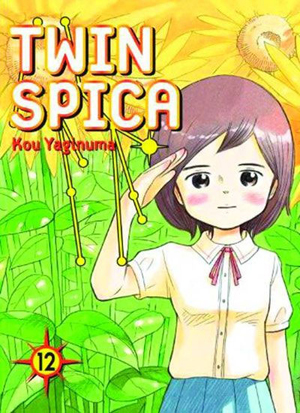 The 12th and final volume of Kou Yaginuma’s Twin Spica manga is upon us at last, and it’s a bittersweet farewell to a series that hopefully hasn’t fallen under the radar for too many. It’s a rare treat to follow a story from beginning to end and have it remain one that manages to evoke many emotions without doing so overtly and desperately. Rather, Twin Spica is a cool, calm summer breeze with just the right balance of melancholy memories and blindingly bright hope for the future.
The 12th and final volume of Kou Yaginuma’s Twin Spica manga is upon us at last, and it’s a bittersweet farewell to a series that hopefully hasn’t fallen under the radar for too many. It’s a rare treat to follow a story from beginning to end and have it remain one that manages to evoke many emotions without doing so overtly and desperately. Rather, Twin Spica is a cool, calm summer breeze with just the right balance of melancholy memories and blindingly bright hope for the future.
I’m going to be a little delicate here. Normally all bets are off when it comes to the end of a series, complaints about spoilers be damned. It’s the final volume, right? However, in the off chance someone is checking this out as an introduction to Twin Spica, I’ll hold back. The last couple of volumes have ended in tragic ways, but the dust settles on recent events and all attention is focused on which students will and won’t make it to the fourth year at Tokyo Space School. At this point, of course, our highest hopes are with protagonist Asumi Kamogawa, but her dear friends and fellow classmates Kei and Marika have just as much at stake. In the end, let’s just say the number of students who manage to move on is shockingly low.
The rest of this massive volume finds everyone searching for their own path, whether it be continuing with the space program or pursuing other parallel dreams. While it has its fair share of tear-jerking moments, much of the book, as is the case with the majority of the series, is filled to the brim with shining optimism. A lot of the heartbreak the characters experience here comes about as a result of life’s inevitable changes; even the positive forks in the road still lead to somewhere away from the familiar comfort of now.
If you haven’t noticed, Twin Spica isn’t really about going to space. Yes, technically it’s a story about young students striving toward that goal, but even when dreams are realized in this final volume, we spend only a handful of pages away from Earth’s atmosphere. Yaginuma seems to go out of his way to avoid depicting those moments in any more detail than absolutely necessary, because Twin Spica begins and ends with the power of friendship and uniting to help one another reach a specific goal. It’s about not giving up individually, but it’s also about not being afraid to lean on someone when you’re in need. Each character comes to terms with this in their own way, and they all notably grow and mature throughout their personal arcs.
Yaginuma closes the book with a more reflective Another Spica, brief bonus chapters which tend to serve as personal anecdotes about his past and the creation of this comic. If the book itself didn’t stir any emotion within you, perhaps the author’s fond, thankful farewell to his loyal readers will. It’s nice to see a creator come off as so genuinely grateful for the opportunity to tell a particular story, and it’s clear Twin Spica meant a lot to Yaginuma from conception to completion. If you were ever wondering why the series seemed to effortlessly click at times, therein lies the answer.
Publisher: Vertical Inc.
Story & Art: Kou Yaginuma
© 2012 Kou Yaginuma

